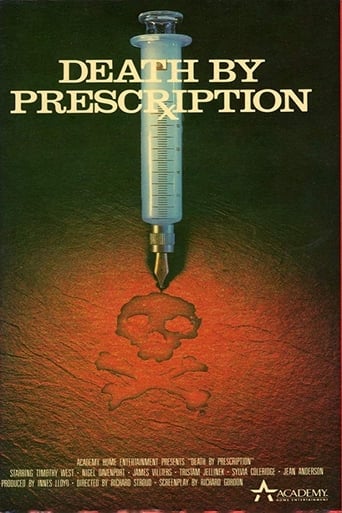



Self-important, over-dramatic, uninspired.
People are voting emotionally.
Good concept, poorly executed.
While it doesn't offer any answers, it both thrills and makes you think.
View More'Easing the passing' was how Bodkin-Adams liked to excuse the mass serial murders he got away with. That is symbolic of this story - smooth, unctuous, oily, lubricated with lies. The effect is heightened further by its location in 50's Eastbourne. Genteel widow country, with Palm Court orchestras playing, and crude accusations strictly unwelcome. Even the barrister starts by telling Adams "I don't want to upset you..." And the doctor himself is forever bringing God's mercy into the picture. It's enough to make some people feel like emptying a bucket over the whole smarmy lot of them.No special genius was needed to fill the star role here; almost any bulky man with a convincing Irish accent would do, and the good stalwart Timothy West gives you your money's worth, as usual. Less convincing are the various widows, who put on a distinctly amateur show of senility, suggesting nothing of that dark cavern of the mind where so many of them dwell in tortured bewilderment. And Nigel Davenport, quite good as the detective, fails the "Er..." test, never easy. But that hesitation is bolted-on, not crafted-in.Best of all are Venetia Barrett as the care-home nurse and Gillian Raine as the matron, who seems ready to spill rather a lot of beans, until she conveniently dies, just before the trial, while under Adams' care.As for his surprise acquittal, you won't realise from this film that it had a lot to do with a top-level gay scandal that needed to be hushed-up (as with the long delay in arresting the Kray twins).And the final irony? We now read about all manner of people queueing-up to pay for assisted suicide - or 'easing the passing' in the best tradition of the good doctor!
View MoreIn 1957 John Bodkin Adams was tried for murdering one of his patients. He was found not guilty and, after being removed from the medical register for four years, went back into medical practise and died in 1983.This film gives a reasonable account of the basic events of the trial, but the presentation is strangely muted. As an example, we see detective Hannam announcing his intention to interview the matron of the nursing home where several of Adams' patients had died. The matron herself dies (after being attended by Adams) before the interview can take place and her evidence is lost. In fact, the matron had already been interviewed several times and Hannam felt she was close to telling all she knew. Her sudden and unexpected death was a remarkably good piece of 'luck' for Adams. However, here we do not see Hannam's reaction to the loss of a key witness and its implications are not emphasised. This is typical of the way this dramatisation seems reluctant to make the most of the material.A new version of the story has great potential to provide excellent drama. The case files on Adams were opened in 2003. It now seems he could have killed about 160 of his patients over many years (short of Shipman's 215, but not bad going). His motivation seems to have been a combination of greed (132 of the 160 left him money or gifts in their wills, making him the richest general practitioner in the country) and some sort of God-complex which led him to feel he was genuinely doing good by 'easing the passing' of his patients (rather like the dear old ladies with the elderberry wine in 'Arsenic and Old Lace').When Adams was brought to trial, however, Britain's National Health Service was in crisis, with doctors threatening to leave and charge money for their services. To convict a doctor of murder would be bad politics. As a result Adams was tried for a death that occurred eight years before, where the body had been cremated and no autopsy was carried out. The prosecution team allowed the General Medical Council (the doctors' professional organisation) to see its files of evidence, and it's assumed the GMC passed copies to Adams defence lawyers which gave them a huge advantage in court.As a result Adams was acquitted, given a slap on the wrist by being unable to practise for four years, and lived another 25 years.The full story would be well worth telling.
View MoreBased on a true story, in 1957 in the UK, Dr. John Bodkin Adams treats primarily elderly female patients. He accepts lower pay if his patients remember him in their wills. Many of them do, and he gets a sports car among other things. In most cases, he's administering large doses of morphine. He's sloppy when it comes to recordsAbout halfway through the movie, he's put on trial for murder, and it does seem he's guilty. However, the nurses' recollections contradict some record books that have been found, and surprisingly things seem to sway in the Doctor's favor. Something that really surprised me was that after the defense rested, the judge gave rather lengthy comments to the jury giving his take on many aspects of the case. I would think in the US those sorts of comments made to the jury by a judge would be illegal, perhaps it's different in the UK.I found this movie a bit disappointing particularly since I didn't understand how things changed around in the trial so much. But evidently the truth of the true story isn't certain either, and the movie perhaps just reflects that?
View More